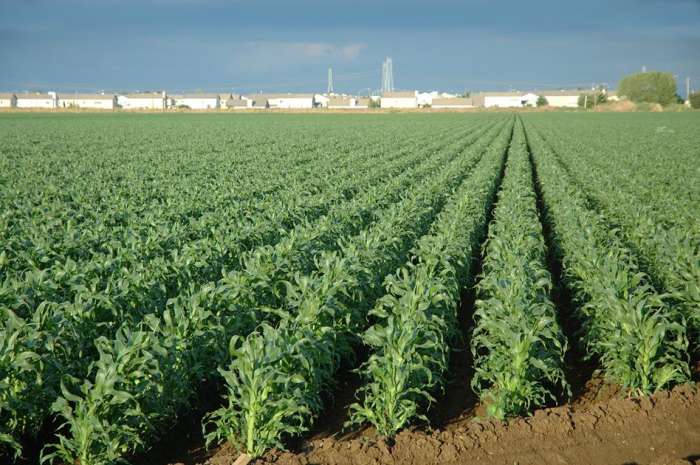


Recently, we welcomed Dr. Brenda Young, Professor of Biology and Director of Daemen College’s Global & Sustainability Program, to the TR Site’s fourth Tuesday speaker series. Dr. Young’s topic was “Feeding the World: Agriculture with a Conservation Ethic.”
She began her presentation by asking three rather weighty questions:
Dr. Young provided some context by quoting Theodore Roosevelt, who addressed a Governor’s Convention in 1908 and cautioned his listeners about the careless use of natural resources:
“…we began with soils of unexampled fertility, and we have so impoverished them by injudicious use and by failing to check erosion that their crop-producing power is diminishing instead of increasing. In a word, we have thoughtlessly, and to a large degree unnecessarily, diminished the resources upon which not only our prosperity but the prosperity of our children and our children’s children must always depend.”
In the century since TR’s warning, agriculture has undergone significant changes. For example, the number of farms has dramatically decreased, from 5.7 million (1900) to 2.1 million (2000). Meanwhile, over the same time frame, the average size of individual farms has grown (from 146 acres to 441 acres) and the average number of commodities produced by each farm has shrunk (from 5.1 to 1.3). So, there are fewer farms today than there were when TR was president, but they are much bigger and more specialized.
Interestingly, however, the total number of acres devoted to agriculture has been remarkably consistent for the past century. This suggests a tremendous increase in productivity. What accounts for that dramatic increase? Dr. Young pointed to several factors: mechanization; “specialty” farming; chemical advances; and genetic modification.
According to Dr. Young, one of the most important agricultural advances of the 20th century (in terms of crop yield) was the development of the Haber-Bosch process, which extracts nitrogen from the air so it can be used in fertilizers. She shared a graph with the audience that showed a remarkable increase in the U.S. corn grain yields, beginning about the same time that use of commercial fertilizers became commonplace.
The so-called Green Revolution, made possible by the work of biologist and Nobel laureate Norman Borlaug, also helps to explain the spike in agricultural productivity. Borlaug’s work in genetics, plant breeding and plant pathology led to high-yield, disease-resistant wheat crops and other advances. Thanks to the work of Borlaug (and others), farmers now get “more” for each seed they plant.
"We are prone to speak of the resources of this country as inexhaustible; this is not so.” (Theodore Roosevelt, Seventh Annual Message to Congress, 3 December 1907)
While the dramatic increase in food production over the past century is encouraging, Dr. Young used TR’s words to remind us that it is as important as ever to consider how natural resources are being used. All of the advances, after all, have not come without certain drawbacks. Factors such as urban sprawl and deforestation have reduced the amount of land available for farming. Modern farming techniques themselves deplete the soil and further reduce the amount of arable land. Soil, Dr. Young pointed outs, is key. When the Soil Food Web is out-of-balance, crops simply cannot thrive. The Dust Bowl of the 1930s is one of the most remarkable examples of what happens when soil is poorly understood and mismanaged.
"Conservation means development as much as it does protection. I recognize the right and duty of this generation to develop and use the natural resources of our land; but I do not recognize the right to waste them, or to rob, by wasteful use, the generations that come after us." (Theodore Roosevelt, 31 August 1910)
Whether TR would find the consequences of modern agriculture to be “wasteful” is up for debate, but Dr. Young highlighted a number of others for the audience. She spoke about the loss of biodiversity that comes with highly specialized farming. A healthy ecosystem relies on diverse crops and animals. Yet, modern agriculture relies on 12 plant species (out of an available 250,000) to provide 75% of the world’s food. Such narrow focus is an invitation to disease – or, as Dr. Young put it, “a pathogen buffet” – as seen during the Irish Potato Famine during the mid-nineteenth century. Along the same lines, standardization has led to a loss of genetic diversity within food crops (check out this graphic). Dr. Young also addressed the issues of colony collapse and the use of pesticides like glyphosate and neonicotinoids.
Circling back to one of her original questions (“Can We Feed the World in 2050?”), Dr. Young’s answer was a mildly-encouraging “MAYBE.” While current projections relating to agricultural output indicate that there is work to be done, Dr. Young suggested that the situation can be improved for future generations by adopting less meat-intensive diets, protecting land and soils, reducing food waste, maintaining diversity (aka, “nature’s insurance policy”), and encouraging regional food production/urban farming.
“…[one] class of [natural] resources consists of those which can not only be used in such manner as to leave them undiminished for our children, but can actually be improved by wise use. The soil, the forests, the waterways come in this category. Every one knows that a really good farmer leaves his farm more valuable at the end of his life than it was when he first took hold of it….[i]n dealing with the soil and its products man can improve on nature by compelling the resources to renew and even reconstruct themselves in such manner as to serve increasingly beneficial uses...” (Theodore Roosevelt, 1908)
--Lenora M. Henson, Curator / Director of Public Programming
*****
Speaker Nite is part of the TR Site’s regular Tuesday evening programming, which is made possible with support from M&T Bank.

The Theodore Roosevelt Inaugural National Historic Site is operated by the Theodore Roosevelt Inaugural Site Foundation, a registered non-profit organization, through a cooperative agreement with the National Park Service.
© 2026 | All Rights Reserved
641 Delaware Avenue, Buffalo, NY 14202 • (716) 884-0095
Website by Luminus
